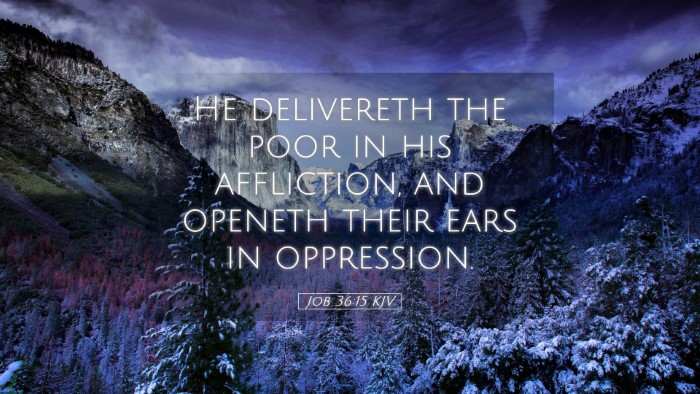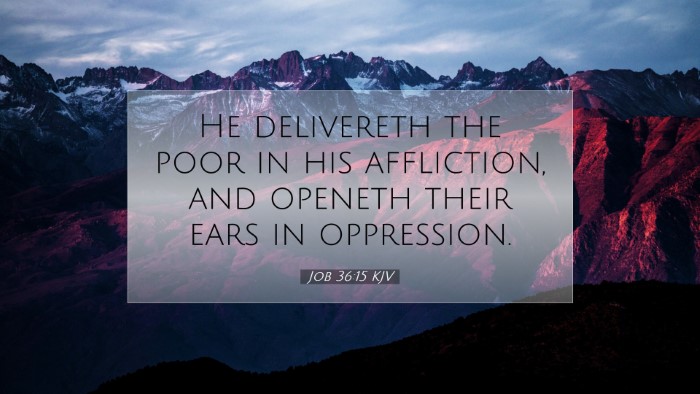Commentary on Job 36:15
"He delivereth the poor in his affliction, and openeth their ears in oppression." (Job 36:15)
Introduction
The verse from Job 36:15 presents a profound truth concerning God's interaction with humanity, particularly through the experiences of suffering and oppression faced by the marginalized and downtrodden. This commentary intertwines insights from historical interpretations, theological reflections, and pastoral applications drawn from prominent public domain commentaries.
Verse Analysis
In examining this verse, we find significant themes: divine deliverance, the plight of the poor, and the deepening of spiritual understanding through trials. Analyzing this text requires attention to each phrase and the overarching implications for God's nature and human experiences.
Divine Deliverance
“He delivereth the poor in his affliction…” The phrase indicates God’s active role in the lives of those who are suffering. Matthew Henry notes that the poor mentioned here may not solely refer to financial poverty but encompasses all who are humble in heart and are in dire situations. God’s deliverance is seen as essential in times of distress, suggesting His compassionate nature.
The Poor and Affliction
This verse highlights the plight of the poor—those overwhelmed by trials and difficulties. Albert Barnes emphasizes that this affliction can serve as a crucial context wherein God reveals His mercy. He suggests that poverty can lead individuals to a greater dependence on God, where their need drives them to seek divine assistance. The acknowledgment of one's needs is often the first step toward spiritual awakening.
Opening Ears in Oppression
“and openeth their ears in oppression.” This part of the verse introduces a transformative element where suffering catalyzes spiritual insight. Adam Clarke argues that through suffering, God not only brings relief but also imparts wisdom and understanding. The ‘opening of ears’ implies that the oppressed gain a fresh perspective—a realizable and deeper comprehension of God’s ways and truths.
Theological Implications
- The Nature of God: This passage affirms God as compassionate and approachable. He is depicted as one who actively engages with the human condition.
- Human Suffering: The juxtaposition of God’s deliverance and human affliction showcases the reality of suffering in the believer’s life. Theologically, it confronts the notion of a distant deity, illustrating instead a God who is intimately involved in the struggles of His creation.
- Divine Instruction: The ‘opening of ears’ symbolizes not only a physical hearing but an ethical and spiritual responsiveness. Suffering becomes a divine pedagogy, teaching humility and reliance on God.
Pastoral Applications
For pastors and theologians, the insights from Job 36:15 resonate deeply within pastoral care contexts. Here are a few key applications:
- Empathy for the Suffering: Understanding that God uses affliction to draw individuals closer to Him can foster a deeper empathy in pastoral care. It can encourage ministers to be agents of comfort and support for those going through challenging times.
- Encouragement to Seek God: This verse serves as a reminder that struggles can lead to spiritual growth. Pastors can encourage congregants to see their trials not merely as hardships but as opportunities for encountering God's guidance and truth.
- Awareness of Justice: The emphasis on the poor speaks to the need for social justice and compassion in ministry. Awareness of the marginalized in society should prompt church leaders to advocate for those suffering oppression.
Conclusion
Job 36:15 provides a theological lens through which the complexities of human suffering and divine intervention can be understood. It should inspire pastors, students, and scholars alike to reflect on God’s intimate, compassionate care for the suffering and the invaluable lessons learned in times of adversity. Through such reflections, the church can develop a more robust theology of suffering that honors God’s presence and active role in our lives.
References from Commentaries
- Matthew Henry: Commentary on the Whole Bible.
- Albert Barnes: Barnes' Notes on the Bible.
- Adam Clarke: Clarke's Commentary on the Bible.


